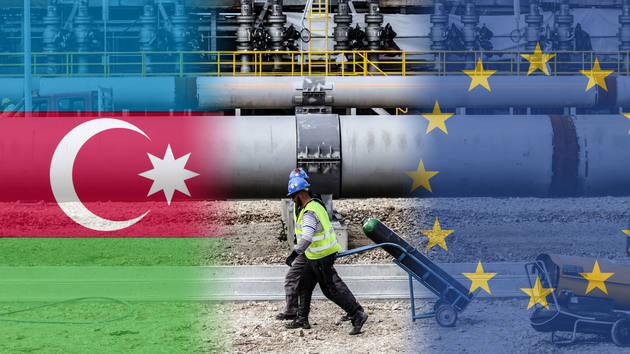Caspian output to reach Europe while Turkmenistan eyes supplier role, SOCAR says. In an interview with Nikkei Asia, SOCAR's vice president said "there are no obstacles left to build new pipelines in the Caspian Sea."
The first commercial gas flows from Azerbaijan to Europe are about to come online from the Trans Adriatic Pipeline, as the recently completed project raises hopes for energy-rich Central Asian states like Turkmenistan, Kazakhstan and Uzbekistan to help feed European energy demand, Nikkei Asia writes in the article Azerbaijan readies gas for EU as Central Asia energy hopes soar.
The TAP consortium, consisting of companies such as Azerbaijan's national oil company SOCAR, BP and Italian Snam, has invested around $5 billion in the 878-km pipeline. Japanese, South Korean and Chinese banks also participated in the 3.9 billion euro ($4.8 billion) financing package, along with European banks. TAP enters Europe from the Greece-Turkey border and ends up in southern Italy.
It is a part of the Southern Gas Corridor, which includes three separate pipeline projects in Azerbaijan, Georgia, Turkey, Greece, Albania and Italy. In all, the 3,500 kilometers of pipeline have cost around $40 billion, including the development of the Shah Deniz gas field in the Caspian Sea. The route offers an alternative gas source for Europe, one that bypasses Russia. Although initial annual capacity is limited to 10 billion cubic meters, the pipeline is designed with the potential to eventually double throughput.
On December 18, European Commissioner for Neighborhood and Enlargement Oliver Varhelyi said: "Building on the important progress made this year in finalizing the Southern Gas Corridor, we are keen on exploring its possible extension to the Western Balkans."
Speaking to Nikkei Asia, SOCAR Vice President Elshad Nassirov said the Southern Gas Corridor has excess capacity, which can be significantly enlarged by adding new compressor stations. He said in the future, Azerbaijan can supply more from Caspian gas resources like the upcoming Absheron field, where the company is planning to start production with French Total as early as next year, or even from ACG oil fields' deep gas reservoir, the operation of which Azerbaijan is currently negotiating with Itochu and Inpex of Japan, among other players.
However, in order to tap the full potential of the new gas corridor, he would like participation from other regions, such as countries in Central Asia and the Eastern Mediterranean.
Talks about linking a pipeline from Turkmenistan to Azerbaijan have been ongoing for decades, but legal disputes in the Caspian Sea have failed to be resolved. But in 2018, countries bordering the Caspian Sea signed an agreement to solve this dispute.
"As all five Caspian littoral states finally signed the convention of legal status of the Caspian Sea in 2018, there are no obstacles left to build new pipelines in the Caspian Sea, connecting their gas to this new corridor," Nassirov said. The nations bordering the Caspian Sea -- Azerbaijan, Turkmenistan, Kazakhstan, Iran and Russia -- all boast rich gas and oil reserves. Nassirov said with the convention, an independent environmental assessment report would suffice to start new pipeline projects in the sea.
"Littoral states like Turkmenistan, Kazakhstan and even [non-littoral] Uzbekistan were waiting for the first link to the markets. Hence, the volume of gas from the region will increase substantially in years to come," Nassirov said, expressing hope for additional gas arrivals to the new route. "Turkmenistan is only 300 km from Azerbaijan," Nassirov said.
Nassirov also welcomed Eastern Mediterranean gas resources found offshore in countries like Egypt, Israel, Cyprus to use the new southern route to reach European markets via Turkey. However, all the countries Nassirov mentioned are currently at odds with Turkey regarding the status and rights over the Mediterranean.
Therefore, Israel, Cyprus and Greece are aiming to build a pipeline directly to Europe, circumventing Turkey, an endeavor that Nassirov feels is not economically viable. "With the current gas prices and needed amount of investments, the Eastern Mediterranean pipeline project does not look feasible for end-users," Nassirov said.
The Trans Adriatic Pipeline pipeline is expected to contribute to the diversification of gas supplies for Southern Europe and the Balkans.






